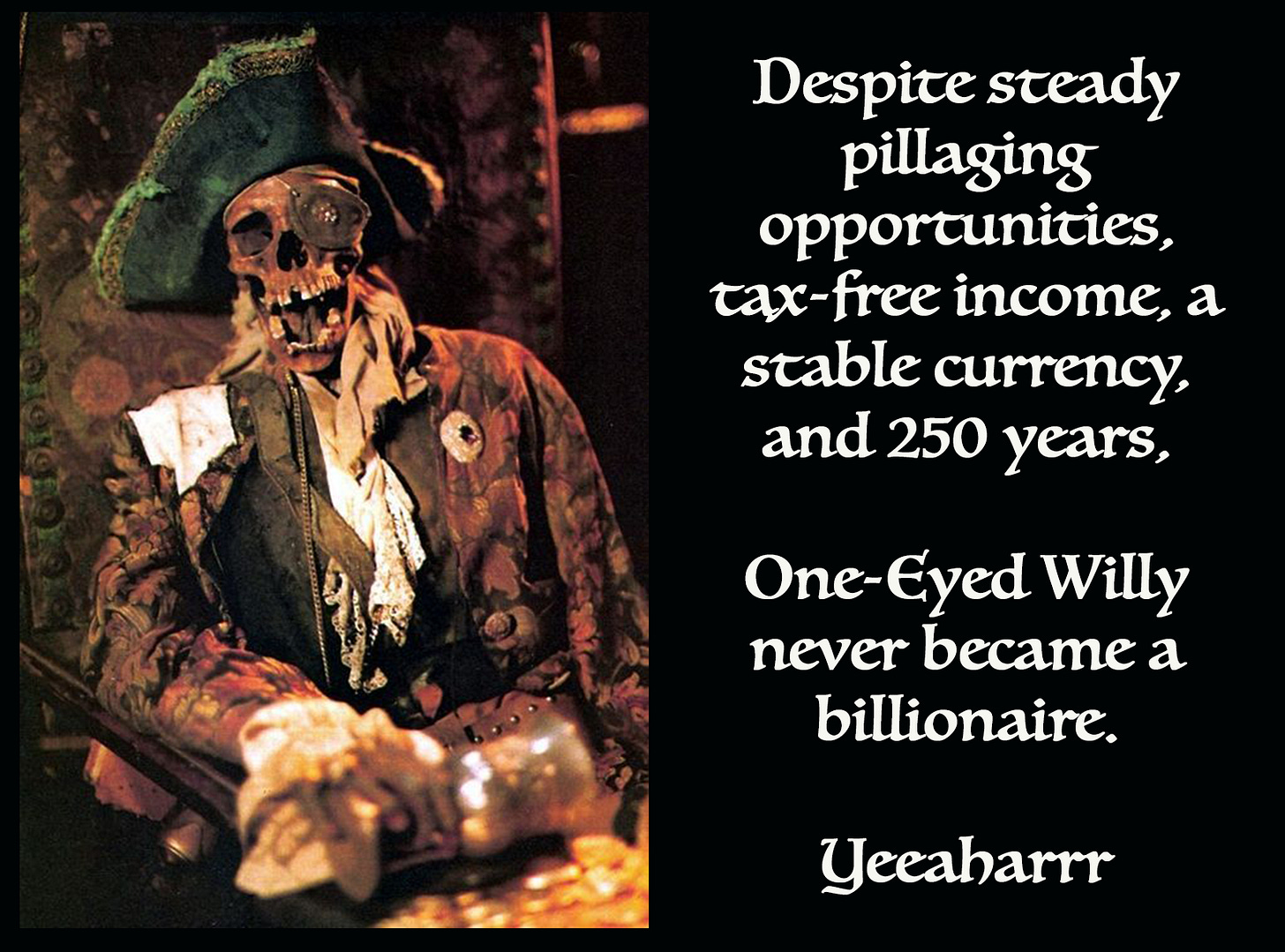Exponential Wealth Through Concentration
How to become a billionaire.
Behind every billionaire is an extraordinary life story. Many started with small fortunes, some with nothing. Few have less than what they were originally given. They are both envied and admired by the people standing in the shadows of the empires they built.
How does it happen? How can a single person amass such wealth in so short a time? Earning $250 per hour, it takes 1,923 years just to earn a billion dollars. And $250 per hour is a fantastic wage for most people.
The answer is fortuitous timing combined with concentration of money and skill. For decades, financial advisors have told us to be diversified with the idiom “don’t put all your eggs in one basket” becoming the common investor Pledge of Allegiance.
Meanwhile, Bill Gates drops out of Harvard and invests every waking hour and available dollar into a new wild idea: the personal computer. The rest is history.
And it’s not just traditional business billionaires that have used this elixir of prosperity. Wherever we find extreme levels of success, we usually find undiversified investment of both time and money. Taylor Swift, Mr. Beast, Joe Rogan, the list could go on.
Sure, there are a some that inherited their wealth but that’s not useful information. We need to reverse engineer the process so we can apply it ourselves. Could it be so easy as to simply put all your chips on a single bet? Some think so. We call them gamblers.
A fool and his money will soon part ways.
Successful deployment demands us to be intentional, persistent, and practical but not so practical that we become over-cautious. The first step is to focus your time, tuning a marketable expertise that can serve as your financial engine.
In his book Outliers, Malcolm Gladwell suggests that it takes 10,000 hours to become truly proficient at something. Perhaps it’s less for you. The lucky are born with talents that serve their interests. For most, it’s a battle of perseverance waged against Father Time.
Second, work your financial engine at maximum load. This could mean breaking away from an employer to start a competing firm, climbing the corporate ladder, or launching a fresh new venture. It requires breaking outside the rut of ordinary performance into the realm of the uncomfortable.
IF executed properly, you should begin to realize abnormal levels of cash-flow. This is where things can get interesting.
The sane thing to do is stay here, harvesting the cash flow to reallocate into traditional investments such as a diversified portfolio. Content with ‘normal people’ returns, this is where most high-net-worth Americans plateau. A safe, and frankly great way to live.
Most billionaires harbor a degree of insanity, however. They continue their concentration strategy, investing time and capital to expand existing and new ventures, risking massive setbacks along the way. Success builds on success, compounding into insane levels of wealth. Outliers indeed.
In one meeting with Jimmy John, the outspoken billionaire owner of Jimmy Johns sandwich franchise, a wealth advisor attempted to pitch a traditional asset allocation strategy. Jimmy John stopped him mid-sentence and asked the advisor if he knew how he made is money. The advisor looked at him blankly and Jimmy John said, “I made a lot of #$&*%@! sandwiches”.
That was the end of that conversation.
This is as good a place as any to insert some ground rules for concentration:
Never risk what you cannot afford to lose, time or money.
Do not lever high-risk assets to buy more high-risk assets.
Be an expert in what you’re doing.
10,000 hours invested in some marketable skill is simply not enough to make anyone a billionaire. Unfortunately for us all, it also requires good timing and placement. It is quite possible to have a grand idea with flawless execution and no outsized payoff.
But as the saying goes, you can’t win the game if you don’t play. And the earlier you start fine-tuning your financial engine, the more weight it can pull over time. Warren Buffet started his first business at the age of 6, which is an intimidating point of fact.
Modern diversification is a plea for mediocrity. The Jack of all trades is earning below market wages, and your 401(k) pie-chart looks like a glutton’s plate at your local buffet - bloated and confused. A clear vision of your future can enlighten a more focused strategy.
Excellence requires us to lean into our strengths with conviction. To become the best at something we can be that is useful to others. This excellence can be harvested for financial security, or it can be exponentialized into a palimpsest of accomplishment.
The true prize in this effort isn’t money, though it is the most tangible thing we can measure. It is our purpose and sense of self-worth. While financial success isn’t guaranteed, you will find out what you are made of. And that is worth something.
Investment advice offered through National Wealth Management Group, LLC.
The information presented is for educational and informational purposes only and is not intended as a recommendation or specific advice. Consult with your financial professional for advice specific to your situation.





